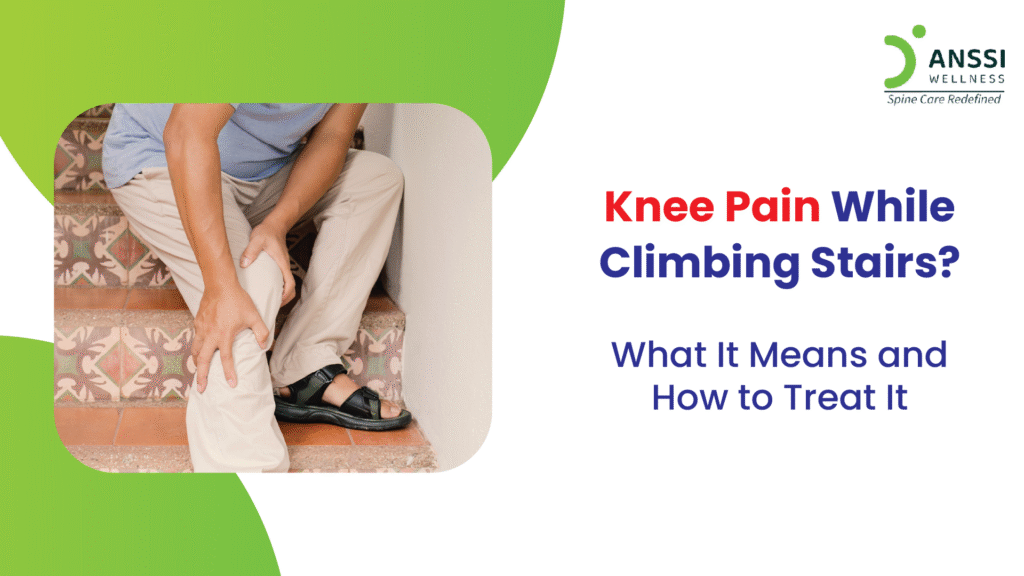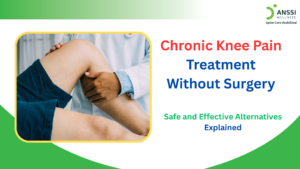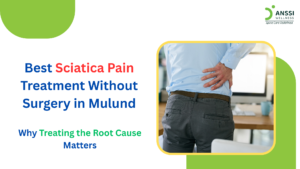Climbing stairs should be a simple, everyday activity. But if you find yourself wincing with knee pain each time you go up or down a staircase, it may be more than just a temporary ache.
Knee pain while climbing stairs is often an early warning sign of Patellofemoral Pain Syndrome (PFPS) or cartilage wear under the kneecap. Left unaddressed, it can lead to chronic discomfort or even early arthritis.
Let’s explore what causes this type of pain, what it means, and most importantly, how you can treat it without surgery or medication.
Why Stairs Cause Knee Pain
Climbing stairs puts significant pressure on your knee joints, up to four times your body weight. This is because the knee must bend deeply and bear the load of your upper body, especially on the way down.
When the muscles around the knee, particularly the quadriceps and hip stabilisers, are weak or imbalanced, the kneecap (patella) may align incorrectly. This misalignment increases friction between the kneecap and the underlying bone, leading to pain, inflammation, and long-term joint damage if not treated properly.
What is Patellofemoral Pain Syndrome (PFPS)?
Patellofemoral pain syndrome, often referred to as “runner’s knee,” is one of the most common causes of knee pain when climbing stairs. It occurs when the patella (kneecap) doesn’t move smoothly within its groove on the femur (thigh bone), resulting in pain around or behind the kneecap.
Common causes of PFPS include:
- Muscle imbalances in the thigh or hips
- Overuse from activities like running or squatting
- Poor foot alignment or flat feet
- Previous injury or trauma to the knee
- Prolonged sitting or a sedentary lifestyle
Symptoms of PFPS often include:
- Dull, aching pain around the kneecap
- Pain worsened by stair climbing, squatting, or sitting for long periods
- A feeling of the knee “not working anymore” or instability
- Occasional swelling or clicking sensations
Role of Cartilage Wear in Knee Pain
Underneath the kneecap lies a smooth layer of cartilage that helps cushion the joint and ensure smooth movement. Over time, repeated stress or injury can wear down this cartilage, leading to a condition known as chondromalacia patella or early knee osteoarthritis.
Cartilage wear causes a grinding or cracking sensation in the knee during movement, particularly when weight is placed on the bent joint, like during stair climbing. If not managed early, cartilage degeneration can lead to persistent pain, inflammation, and joint stiffness.
Effective Treatment Approaches
The good news is that most cases of PFPS and early cartilage wear can be effectively managed with non-surgical treatments. Early intervention helps restore strength, reduce pain, and prevent long-term damage.
Here’s how you can take control:
1. Physical Therapy and Strengthening
Physical therapy focuses on improving alignment, flexibility, and strength in the muscles that support the knee.
Specific exercises can help:
- Strengthen quadriceps, hamstrings, and glutes
- Improve hip and core stability
- Enhance range of motion
- Promote proper kneecap tracking
Low-impact exercises like stationary cycling, swimming, or walking on level surfaces can also improve joint health without stressing the knees.
2. Knee-Friendly Stretches and Mobility Work
Tight muscles around the knee and hips can contribute to misalignment and pain. Gentle stretching of the hamstrings, calves, and iliotibial (IT) band can relieve pressure around the kneecap.
Daily stretches combined with foam rolling may help improve blood flow, reduce inflammation, and restore natural movement patterns.
3. Posture and Footwear Correction
Poor posture and foot alignment can cause the knees to rotate inward, worsening PFPS.
Solutions include:
- Orthotic inserts to correct flat feet or overpronation
- Supportive footwear with proper arch support
- Postural training to align the hips, knees, and ankles correctly
About ANSSI:
ANSSI Wellness focuses on improving the quality of life for patients suffering from spinal issues, aiming to provide relief where other conventional treatments have failed. Through advanced non-surgical spinal decompression treatment, ANSSI is committed to helping patients avoid surgery and recover in a safe, effective, and compassionate environment.
Connect with ANSSI Wellness on LinkedIn, Instagram, and Facebook for expert guidance.




